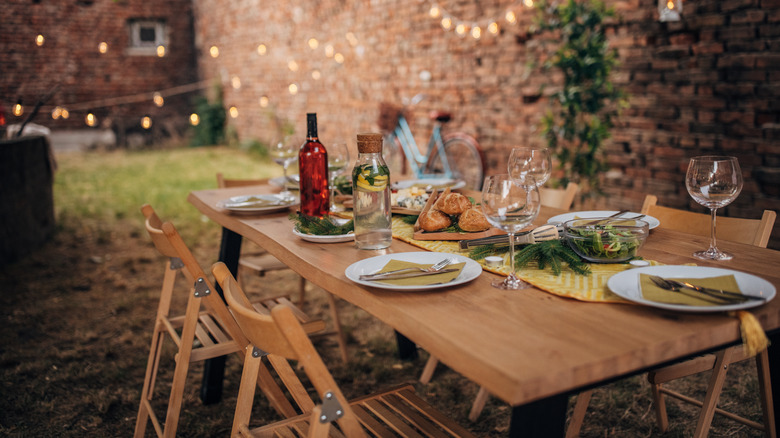The Etiquette Rule You Might Be Breaking At Someone Else's House
Food etiquette doesn't just matter when you're dining at fancy restaurants. It's applicable in all scenarios, from backyard barbecues to drive-thrus (especially on rainy days). But, because each situation is different, the rules for what is considered good conduct are also different. For example, etiquette in the homes of friends and family, particularly casual dinner parties, is largely centered around social interactions and not on which fork to use.
Notably, recipes are one of the biggest contention points when dining in someone else's home. There are strict etiquette guidelines regarding the solicitation of recipes, as well as rules for how hosts can politely decline. Not everybody, it should be noted, wants to share their secret dishes, let alone family recipes which may have been passed down for generations. Despite its complimentary nature (you liked the dish enough to ask how to make it, after all), you may want to avoid doing this altogether.
The real etiquette no-no, and one rule you should never break when dining in someone's home, is offering commentary on recipes or dishes that could be seen as insulting, even if isn't intended that way. Often, this is as a result of poor word choice, and there are several words or phrases that should always be avoided.
How to not insult the dinner party hosts
Almost no one sets out to insult their hosts, but it can easily happen without even meaning to — especially when you're commenting on a dish that's being presented. Words like "interesting" or "actually," for example, should never be used in a dining context. The first is almost always assumed to be a faux polite synonym for bad, i.e. "This braised rabbit is really interesting." The latter, by contrast, implies something that exceeded your expectations — and implying to your hosts that you had low expectations for their cooking. For example, "This pot roast is actually really good."
Even an honest inquiry into what is being served can be taken as rude if it's phrased awkwardly, such as, "What in the world is this?"
As such, word choice is very important when dining in someone's home, and comments that are meant to be flattering can sometimes be taken as insults if they're not clearly and appropriately phrased. That being said, there is no amount of clever wording that can make up for suggesting that someone's cooking could have been improved with the addition of another ingredient, or by using a different preparation method. Critical comments, however truthful, are always rude; even if they were directly requested by someone that values your input.
The best kind of flattery
Abject flattery is never a bad idea when you're enjoying food that someone else has prepared — especially when you're dining in their home. Such flattery can also prove beneficial to you. If, for instance, you really do want to get a recipe, the most polite way to do so is not by asking your host, but by making flattering comments that result in the recipe being offered. Asking questions about the ingredients, or repeatedly raving about its taste, are subtler ways to accomplish this objective, without putting your host in a situation where they might have to say no.
That's not to say all in-home dining etiquette rules are just social norms. You'll still want to observe basic table manners, and follow your host's cues when it comes to when and where to eat. Nor should you show up to anyone's house empty-handed (a bottle of wine or dessert can go a long way).
But, saying the right things in these situations is just as important, if not more so, than doing the right things — at least if you want to get invited back again in the future.



